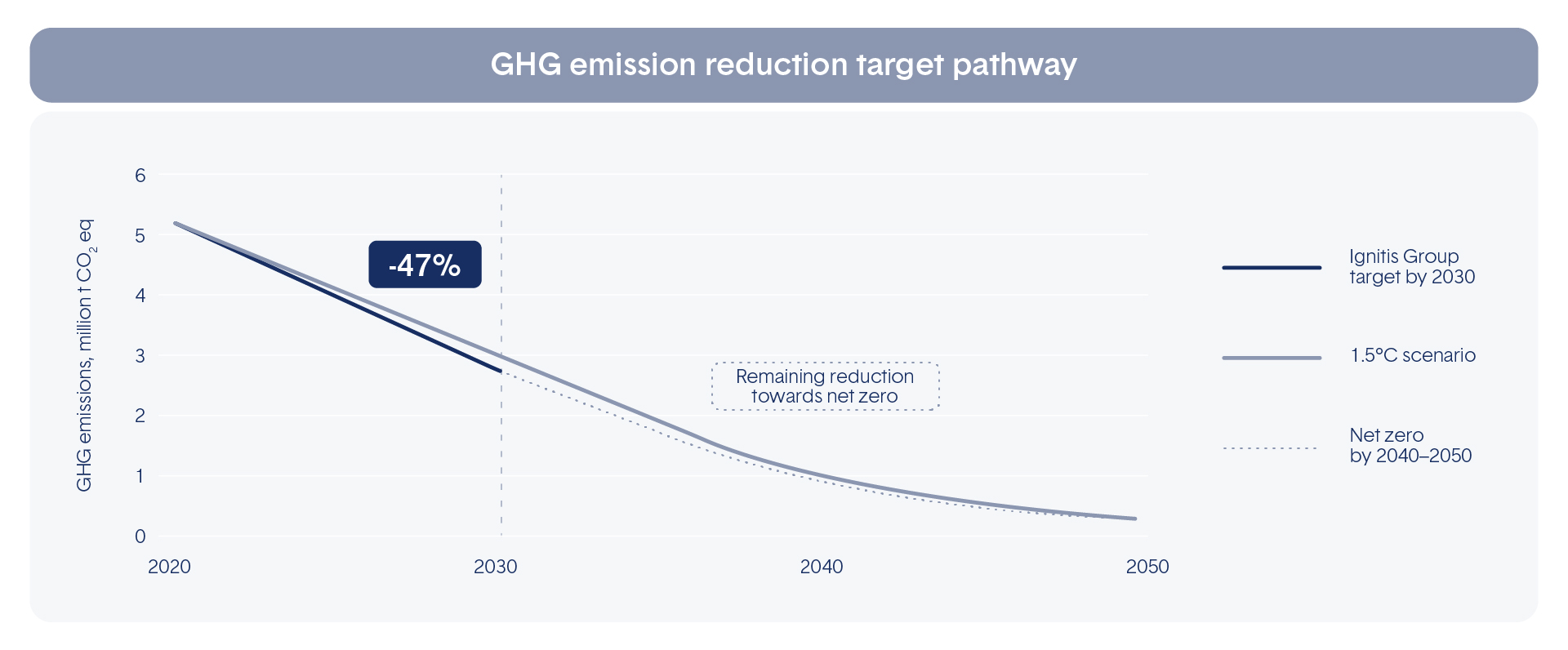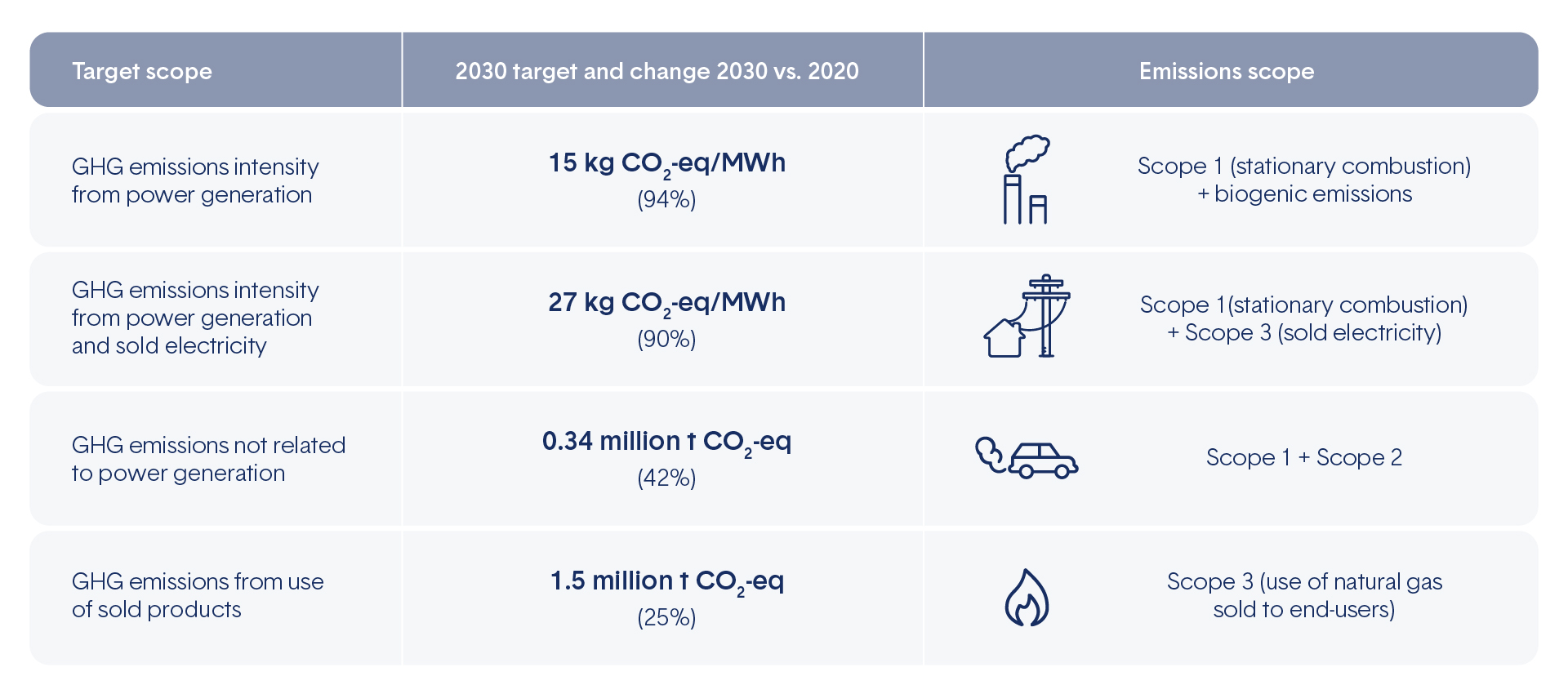Climate action
Climate change is one of the greatest challenges facing humanity in this century, and the actions of everyone – states, businesses, non-governmental organizations, and society – are important. Although energy drives the economy, its production accounts for a significant share of greenhouse gas (GHG) emissions. Therefore, the transformation and decarbonization of the energy sector are prerequisites for the implementation of the Paris Agreement and for limiting the average global temperature increase to 1.5 °C compared to the pre-industrial revolution levels.
Climate clock shows the time when the carbon budget will run out in relation to the current emissions and the global temperature increase caused by human activities.
Climate action
Science-based targets
By joining the Business Ambition for 1.5 °C initiative, Ignitis Group has committed itself to achieving net zero by 2050 the latest. Ignitis Group’s ambitious interim greenhouse gas (GHG) emission reduction targets were validated by the Science-Based Targets initiative in November 2021, which confirmed that our targets comply with the latest scientific recommendations on the steps to be taken to keep global temperature increase to well-below 1.5 °C. We are the first Lithuanian capital company whose GHG emission reduction targets have been validated by the initiative of global organizations battling climate change. The number of organizations whose targets have been validated reaches just over 1,800 globally.

GHG emission reduction strategy
Ignitis Group’s ambitious greenhouse gas (GHG) emission reduction targets were validated by the Science-Based Targets initiative in November 2021. The Group is the first Lithuanian capital company and one out of just over four thousand companies globally that have their GHG emission reduction targets validated by the joint initiative of global organizations taking climate action.
Science-based targets show companies how much and how fast they need to reduce their GHG emissions to avoid the biggest negative effects of climate change. Companies are encouraged to meet long-term targets by 2050 and interim targets to limit global temperature increase to 1.5 °C and prevent the worst effects of climate change.
The SBTi, an initiative that helps companies set emission reduction targets, is a partnership between well-known global organizations (such as the CDP, the United Nations Global Compact, the World Resources Institute and the World Wide Fund for Nature) to limit global warming to 1.5 °C and avoid the worst effects of climate change. The SBTi has developed a target setting methodology to ensure that companies are acting according to science, while the initiative assesses companies’ targets independently. More information can be found here.

The Ignitis Group's commitments are in line with the 1.5 °C target in all emission Scopes as defined in the GHG protocol:
Ignitis Group commits to reduce scope 1 GHG emissions from electricity and heat generation by 94% per MWh by 2030 from a 2020 baseline.*
Ignitis Group also commits to reduce scope 1 and 3 GHG emissions from all electricity and heat sold by 90% per MWh within the same timeframe.*
Ignitis Group commits to reduce absolute scope 1 and 2 GHG emissions from all other sources by 42% and reduce absolute scope 3 GHG emissions from use of sold products by 25% within the same timeframe.
*The target boundary includes biogenic emissions and removals from bioenergy feedstocks.
Ignitis Group emission reduction targets

Targets cover at least 95 % of company-wide scope 1 and 2 emissions, and the scope 3 target boundary includes at least two-thirds of total scope 3 emissions as required by SBTi criteria. More information on Ignitis Group's emissions can be found here.
How do we reduce our emissions?
Ignitis Group aims to achieve its targets by lowering the emissions from its activities and involving its partners, suppliers and customers in the process. The foreseen emission reduction measures include growing green generation capacity, increasing the share of green electricity in internal operations and in customer sales, promoting the customer transition from natural gas to electricity, reducing natural gas distribution network losses, upgrading its vehicle fleet with electric vehicles, etc.

Ignitis Group's innovation projects and partnerships with educational institutions and scientific organizations that pursue and offer emission reduction, energy efficiency solutions, as well as tools for capturing emissions from the atmosphere will play a key role in reducing emissions.
Ignitis Group is looking for solutions that will help streamline activities and services, reduce energy consumption and the impact on the environment. Solutions under development or the ones that are already being offered to customers include:
- following the successful development of the remote solar parks project, the participation of prosumers in remote wind farm projects is being considered;
- the possibility of mixing green hydrogen with gas and supplying it to consumers is being examined;
- Ignitis Group is developing an app that will provide users with information on energy consumption at home, promote more efficient energy usage and help reduce GHG emissions;
- development of energy storage solutions for consumers who want to avoid the costs of network renovation after installing renewable energy generation facilities;
- business customers can offset their CO2 footprint by investing in green energy.
More information about Ignitis Group’s R&D projects can be found on the Ignitis Innovation Hub website.
GHG emissions data
GHG emissions1 | Unit | 2023 | 2022 | 2021 |
|---|---|---|---|---|
Direct (Scope 1) emissions | Thousand t CO2 -eq | 455 | 463 | 732 |
Indirect (Scope 2) emissions (location-based) | Thousand t CO2 -eq | 117 | 192 | 102 |
Indirect (Scope 2) emissions (marked-based) | Thousand t CO2 -eq | 418 | 496 | 529 |
Other indirect (Scope 3) emissions | Thousand t CO2 -eq | 4,057 | 3,949 | 3,275 |
TOTAL (Scope 1, 2, 3 location-based) | Thousand t CO2 -eq | 3,000 | 3,859 | 3,108 |
TOTAL (Scope 1, 2, 3 market based) | Thousand t CO2 -eq | 4,930 | 4,908 | 4,536 |
Emissions outside the specified scopes (biogenic origin)2 | Thousand t CO2 -eq | 361 | 259 | 217 |
TOTAL3 | Thousand t CO2 -eq | 5,291 | 5,167 | 4,753 |
1 Emissions and intensity indicators for 2022 are slightly different from Annual report 2022 due to the revised data.
2 In order to ensure complete disclosure of emissions, we present biogenic emissions from renewable energy sources separately (CO2 emissions from combustion of biofuels and the biodegradable fraction of waste).
3 The Group utilises a market-based approach to calculate emissions.
Verification
We always audit our emission calculations. You can find the latest and historical reports here:
2023 GHG inventory report and verification statement
2022 GHG inventory report and verification statement
GHG emissions
Greenhouse gas (GHG) emissions of Ignitis Group
Scope 1 – Direct GHG emissions
Direct GHG emissions from GHG sources owned or controlled by the Group. Direct GHG emissions include:
- emissions from mobile combustion sources associated with transport;
- emissions from own power generation facilities (stationary combustion);
- fugitive methane (CH4) emissions (natural gas distribution);
- fugitive emissions from refrigerant gases.
Scope 2 – Indirect GHG emissions
Indirect GHG emissions come from electricity, heat or steam generation of external origin consumed by the organization. Indirect GHG emissions include:
- emissions associated with the consumption of electricity;
- emissions associated with the consumption of thermal energy;
- emissions associated with grid losses during the distribution of third-party power (electricity distribution).
Scope 3 – Other indirect emissions
All other indirect emissions of the Group’s activities which are emitted by sources that are not owned or controlled by the Group. Other indirect emissions include emissions from:
- purchased goods and services – third-party emissions from manufacturing of the goods and services used by the Group in its operations;
- fuel- and energy-related activities – third-party emissions from extraction, production, and transportation of fuels and electricity purchased by the Group from third parties for sale to end users;
- upstream transportation and distribution – third-party emissions associated with transportation of goods (e.g., fuels such as biofuel, waste) used by the Group in its operations;
- waste generated in operations – based on actual and estimated generated amount of waste;
- business travel – emissions associated with flights taken by employees for business travel purposes;
- downstream transportation and distribution – third-party emissions associated with transportation of products of the Group (e.g., ash generated from operations of the plants);
- use of sold products – emissions associated with use of sold products (e.g., emissions from natural gas combustion by the end user);
- downstream leased assets – emissions from the operation of assets leased by the Group.
Out of scope emissions
Biogenic emissions (CO2 emissions from the combustion of biomass and biodegradable fraction of waste).
Exclusions
The criteria for emissions assessment were based on their materiality. Emissions that do not figure highly (<5%) in relation to total emissions were not included. Emissions sources that have been identified and excluded from the GHG emissions inventory are presented below:
- bus, taxi, car sharing travels. Reason for exclusion – minimal impact in relation to total emissions of the Group;
- emissions from production of capital goods (e.g., construction) by Ignitis Group. Reason for exclusion – lack of reliable data.

